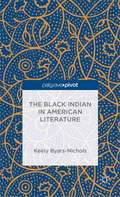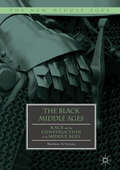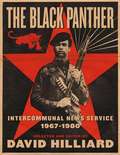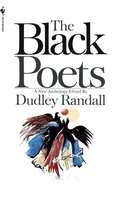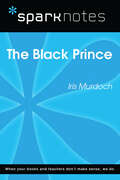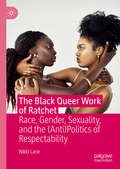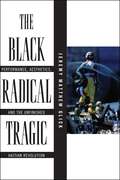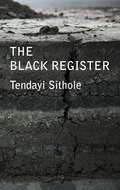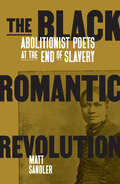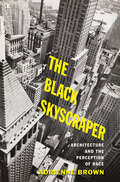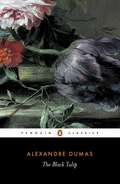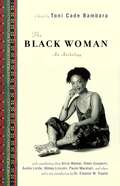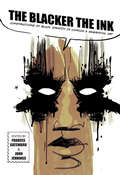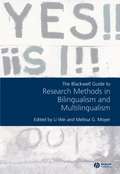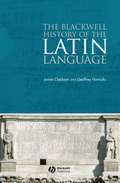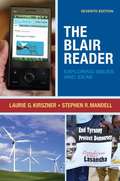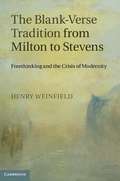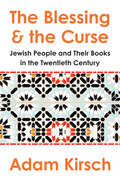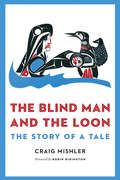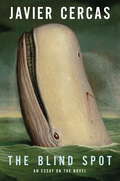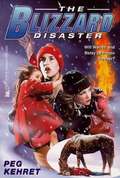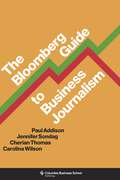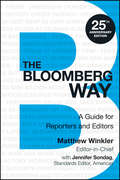- Table View
- List View
The Black Indian in American Literature
by Keely Byars-NicholsThe first book-length study of the figure of the black Indian in American Literature, this project explores themes of nation, culture, and performativity. Moving from the Post-Independence period to the Contemporary era, Byars-Nichols re-centers a marginalized group challenges stereotypes and conventional ways of thinking about race and culture.
The Black Middle Ages: Race and the Construction of the Middle Ages (The New Middle Ages)
by Matthew X. VernonThe Black Middle Ages examines the influence of medieval studies on African-American thought. Matthew X. Vernon focuses on nineteenth century uses of medieval texts to structure racial identity, but also considers the flexibility of medieval narratives more broadly in the medieval period, twentieth and twenty-first centuries. This book engages disparate discourses to reassess African-American positionalities in time and space. Utilizing a transhistorical framework, Vernon reflects on medieval studies as a discipline built upon a contended set of ideologies and acts of imaginative appropriation visible within source texts and their later mobilizations.
The Black Panther
by David Hilliard"We knew from the beginning how critical it was to have our own publication, to set forth our agenda for freedom...to urge change, to use the pen alongside the sword," writes David Hilliard in the preface to this stunning collection of pages from the original groundbreaking editions of the Black Panther Party's official news organ and original essays by Hilliard, Elaine Brown, Dr. Stan Oden, Craig Laurence Rice, Kumasi, and Joshua Bloom. First called The Black Panther Community News Service and then The Black Panther Intercommunal News Service (BPINS), the weekly periodical was nationally and internationally distributed. It was "sold in small stores in black communities, through subscriptions, and, mostly, on the streets by dedicated Party members," writes Brown, a party leader and author of A Taste of Power, in this edition. In its heyday, the Party sold several hundred thousand copies of the newspaper per week and was highly regarded for the quality of its content by media professionals and its legion of readers alike. It ultimately became the most influential independent black newspaper in the United States, known not only for its fearless reportage and analysis but its stunning photographs and illustrations, including provocative and humorous political cartoons. Published in time to mark the 40th anniversary of the BPINS, this book is, at once, an invaluable document of a little-known aspect of American history and a celebration of one of the most stunning accomplishments of a cultural and political movement that changed the nation. The original DVD, included in the back of the book, makes this a multimedia package that readers across generations can appreciate, documenting events and leaders of the past who still resonate and influence culture and politics today.
The Black Poets
by Dudley RandallThe claim of The Black Poets to being. . . an anthology is that it presents the full range of Black-American poetry, from the slave songs to the present day. It is important that folk poetry be included because it is the root and inspiration of later, literary poetry. Not only does this book present the full range of Black poetry, but it presents most poets in depths, and in some cases presents aspects of a poet neglected or overlooked before. Gwendolyn Brooks is represented not only by poems on racial and domestic themes, but is revealed as a writer of superb love lyrics. Turning away from White models and returning to their roots has freed Black poets to create a new poetry. This book records their progress. --from the Introduction by Dudley Randall
The Black Prince (SparkNotes Literature Guide Series)
by SparkNotesThe Black Prince (SparkNotes Literature Guide) by Iris Murdoch Making the reading experience fun! Created by Harvard students for students everywhere, SparkNotes is a new breed of study guide: smarter, better, faster.Geared to what today's students need to know, SparkNotes provides:chapter-by-chapter analysis explanations of key themes, motifs, and symbols a review quiz and essay topics Lively and accessible, these guides are perfect for late-night studying and writing papers.
The Black Queer Work of Ratchet: Race, Gender, Sexuality, and the (Anti)Politics of Respectability
by Nikki LaneThis book enters as a corrective to the tendency to trivialize and (mis)appropriate African American language practices. The word ratchet has entered into a wider (whiter) American discourse the same way that many words in African American English have—through hip-hop and social media. Generally, ratchet refers to behaviors and cultural expressions of Black people that sit outside of normative, middle-class respectable codes of conduct. Ratchet can function both as a tool for critiquing bad Black behavior, and as a tool for resisting the notion that there are such things as “good” and “bad” behavior in the first place. This book takes seriously the way ratchet operates in the everyday lives of middle-class and upwardly mobile Black Queer women in Washington, DC who, because of their sexuality, are situated outside of the norms of (Black) respectability. The book introduces the concept of “ratchet/boojie cultural politics” which draws from a rich body of Black intellectual traditions which interrogate the debates concerning what is and is not “acceptable” Black (middle-class) behavior. Placing issues of non-normative sexuality at the center of the conversation about notions of propriety within normative modes of Black middle-class behavior, this book discusses what it means for Black Queer women’s bodies to be present within ratchet/boojie cultural projects, asking what Black Queer women’s increasing visibility does for the everyday experiences of Black queer people more broadly.
The Black Radical Tragic: Performance, Aesthetics, and the Unfinished Haitian Revolution (America and the Long 19th Century #2)
by Jeremy Matthew Glick2017 Nicolás Guillén Outstanding Book Award presented by the Caribbean Philosophical AssociationAs the first successful revolution emanating from a slave rebellion, the Haitian Revolution remains an inspired site of investigation for a remarkable range of artists and activist-intellectuals in the African Diaspora.In The Black Radical Tragic, Jeremy Matthew Glick examines twentieth-century performances engaging the revolution as laboratories for political thinking. Asking readers to consider the revolution less a fixed event than an ongoing and open-ended history resonating across the work of Atlantic world intellectuals, Glick argues that these writers use the Haitian Revolution as a watershed to chart their own radical political paths, animating, enriching, and framing their artistic and scholarly projects. Spanning the disciplines of literature, philosophy, and political thought, The Black Radical Tragic explores work from Lorraine Hansberry, Sergei Eisenstein, Edouard Glissant, Malcolm X, and others, ultimately enacting a speculative encounter between Bertolt Brecht and C.L.R. James to reconsider the relationship between tragedy and revolution. In its grand refusal to forget, The Black Radical Tragic demonstrates how the Haitian Revolution has influenced the ideas of freedom and self-determination that have propelled Black radical struggles throughout the modern era.
The Black Register (Critical South)
by Tendayi SitholeHow can thinkers grapple with the question of the human when they have been dehumanized? How can black thinkers confront and make sense of a world structured by antiblackness, a world that militates against the very existence of blacks? These are the questions that guide Tendayi Sithole’s brilliant analyses of the work of Sylvia Wynter, Aimé Césaire, Steve Biko, Assata Shakur, George Jackson, Mabogo P. More, and a critique of Giorgio Agamben. Through his careful interrogation of their writings Sithole shows how the black register represents a uniquely critical perspective from which to confront worlds that are systematically structured to dehumanize. The black register is the ways of thinking, knowing and doing that emerge from existential struggles against antiblackness and that dwell in the lived experience of being black in an antiblack world. The black register is the force of critique that comes from thinkers who are dehumanized, and who in turn question, define, and analyze the reality that they are in, in order to reframe it and unmask the forces that inform subjection. This book redefines the arc of critical black thought over the last seventy-five years and it will be an indispensable text for anyone concerned with the deep and enduring ways in which race structures our world and our thought.
The Black Reproductive: Unfree Labor and Insurgent Motherhood
by Sara Clarke KaplanHow Black women&’s reproduction became integral to white supremacy, capitalism, and heteropatriarchy—and remains key to their dismantling In the United States, slavery relied on the reproduction and other labors of unfree Black women. Nearly four centuries later, Black reproductivity remains a vital technology for the creation, negotiation, and transformation of sexualized and gendered racial categories. Yet even as Black reproduction has been deployed to resolve the conflicting demands of white supremacy, capitalism, and heteropatriarchy, Sara Clarke Kaplan argues that it also holds the potential to destabilize the oppressive systems it is supposed to maintain.The Black Reproductive convenes Black literary and cultural studies with feminist and queer theory to read twentieth- and twenty-first-century texts and images alongside their pre-emancipation counterparts. These provocative, unexpected couplings include how Toni Morrison&’s depiction of infanticide regenders Orlando Patterson&’s theory of social death, and how Mary Prince&’s eighteenth-century fugitive slave narrative is resignified through the representational paradoxes of Gayl Jones&’s blues novel Corregidora. Throughout, Kaplan offers new perspectives on Black motherhood and gendered labor, from debates over the relationship between President Thomas Jefferson and Sally Hemings, to the demise of racist icon Aunt Jemima, to discussions of Black reproductive freedom and abortion. The Black Reproductive gives vital insight into the historic and ongoing conditions of Black unfreedom, and points to the possibilities for a Black feminist practice of individual and collective freedom.
The Black Romantic Revolution: Abolitionist Poets at the End of Slavery
by Matt SandlerThe prophetic poetry of slavery and its abolitionDuring the pitched battle over slavery in the United States, Black writers—enslaved and free—allied themselves with the cause of abolition and used their art to advocate for emancipation and to envision the end of slavery as a world-historical moment of possibility. These Black writers borrowed from the European tradition of Romanticism—lyric poetry, prophetic visions--to write, speak, and sing their hopes for what freedom might mean. At the same time, they voiced anxieties about the expansion of global capital and US imperial power in the aftermath of slavery. They also focused on the ramifications of slavery's sexual violence. Authors like Frances Ellen Watkins Harper, George Moses Horton, Albery Allson Whitman, and Joshua McCarter Simpson conceived the Civil War as a revolutionary upheaval on par with Europe's stormy Age of Revolutions. The Black Romantic Revolution proposes that the Black Romantics' cultural innovations have shaped Black radical culture to this day, from the blues and hip hop to Black nationalism and Black feminism. Their expressions of love and rage, grief and determination, dreams and nightmares, still echo into our present.
The Black Skyscraper: Architecture and the Perception of Race
by Adrienne BrownHow did writers and artists view the intersection of architecture and race in the modernist era?Winner of the MSA First Book Prize of the Modernist Studies AssociationWith the development of the first skyscrapers in the 1880s, urban built environments could expand vertically as well as horizontally. Tall buildings emerged in growing cities to house and manage the large and racially diverse populations of migrants and immigrants flocking to their centers following Reconstruction. Beginning with Chicago's early 10-story towers and concluding with the 1931 erection of the 102-story Empire State Building, Adrienne Brown's The Black Skyscraper provides a detailed account of how scale and proximity shape our understanding of race.Over the next half-century, as city skylines grew, American writers imagined the new urban backdrop as an obstacle to racial differentiation. Examining works produced by writers, painters, architects, and laborers who grappled with the early skyscraper's outsized and disorienting dimensions, Brown explores this architecture's effects on how race was seen, read, and sensed at the turn of the twentieth century. In lesser-known works of apocalyptic science fiction, light romance, and Jazz Age melodrama, as well as in more canonical works by W. E. B. Du Bois, F. Scott Fitzgerald, Aaron Douglas, and Nella Larsen, the skyscraper mediates the process of seeing and being seen as a racialized subject. From its distancing apex—reducing bodies to specks—to the shadowy mega-blocks it formed at street level, the skyscraper called attention, Brown argues, to the malleable nature of perception. A highly interdisciplinary work, The Black Skyscraper reclaims the influence of race on modern architectural design as well as the less-well-understood effects these designs had on the experience and perception of race.
The Black Tulip
by Alexandre DumasSet at the height of the "tulipomania" that gripped Holland in 17th century, this is the story of Cornelius van Baerle, a humble grower whose sole desire is to grow the perfect specimen of the tulip negra. When his godfather is murdered, Cornelius finds himself caught up in the deadly politics of the time, imprisoned and facing a death sentence. His jailor's daughter Rosa, holds both the key to his survival and his chance to produce the ultimate tulip.
The Black Woman: An Anthology
by Toni Cade Bambara Eleanor W TraylorA collection of early, emerging works from some of today's most celebrated African American female writers When it was first published in 1970, The Black Woman introduced readers to an astonishing new wave of voices that demanded to be heard. In this groundbreaking volume of original essays, poems, and stories, a chorus of outspoken women -- many who would become leaders in their fields: bestselling novelist Alice Walker, poets Audre Lorde and Nikki Giovanni, writer Paule Marshall, activist Grace Lee Boggs, and musician Abbey Lincoln among them -- tackled issues surrounding race and sex, body image, the economy, politics, labor, and much more. Their words still resonate with truth, relevance, and insight today.
The Blacker the Ink
by John Jennings Craig Fischer Frances Gateward Rebecca Wanzo William Lafi Youmans Kinohi Nishikawa Blair Davis Nancy Goldstein Daniel F. Yezbick Sally Mcwilliams James J. Zeigler Qiana Whitted Reynaldo Anderson Hershini Bhana Young Robin Means Coleman Patrick F. Walter Consuela Francis Andre CarringtonWhen many think of comic books the first thing that comes to mind are caped crusaders and spandex-wearing super-heroes. Perhaps, inevitably, these images are of white men (and more rarely, women). It was not until the 1970s that African American superheroes such as Luke Cage, Blade, and others emerged. But as this exciting new collection reveals, these superhero comics are only one small component in a wealth of representations of black characters within comic strips, comic books, and graphic novels over the past century. The Blacker the Ink is the first book to explore not only the diverse range of black characters in comics, but also the multitude of ways that black artists, writers, and publishers have made a mark on the industry. Organized thematically into "panels" in tribute to sequential art published in the funny pages of newspapers, the fifteen original essays take us on a journey that reaches from the African American newspaper comics of the 1930s to the Francophone graphic novels of the 2000s. Even as it demonstrates the wide spectrum of images of African Americans in comics and sequential art, the collection also identifies common character types and themes running through everything from the strip The Boondocks to the graphic novel Nat Turner. Though it does not shy away from examining the legacy of racial stereotypes in comics and racial biases in the industry, The Blacker the Ink also offers inspiring stories of trailblazing African American artists and writers. Whether you are a diehard comic book fan or a casual reader of the funny pages, these essays will give you a new appreciation for how black characters and creators have brought a vibrant splash of color to the world of comics.
The Blackwell Guide to Research Methods in Bilingualism and Multilingualism (Guides to Research Methods in Language and Linguistics)
by Li Wei Melissa G. MoyerAs globalization has increased awareness of the extent of language contact and linguistic diversity, questions concerning bilingualism and multilingualism have taken on an increasing importance from both practical and scholarly points of view. Written by leading experts and practitioners in the field, The Blackwell Guide to Research Methods in Bilingualism and Multilingualism: Highlights the interdisciplinary nature of research on bilingualism and multilingualism and offers a practical guide to the procedures and tools for collecting and analyzing data Specifically addresses methodological issues, discussing research topics, core concepts and approaches, and the methods and techniques available Links theory to method, and to data, and answers a real need for a know-how volume on bilingualism and multilingualism that deals with its methodology in a systematic and coherent way
The Blackwell History of the Latin Language
by James Clackson Geoffrey HorrocksThis text makes use of contemporary work in linguistics to provide up-to-date commentary on the development of Latin, from its prehistoric origins in the Indo-European language family, through the earliest texts, to the creation of the Classical Language of Cicero and Vergil, and examines the impact of the spread of spoken Latin through the Roman Empire. The first book in English in more than 50 years to provide comprehensive coverage of the history of the Latin language Gives a full account of the transformation of the language in the context of the rise and fall of Ancient Rome Presents up-to-date commentary on the key linguistic issues Makes use of carefully selected texts, many of which have only recently come to light Includes maps and glossary as well as fully translated and annotated sample texts that illustrate the different stages of the language Accessible to readers without a formal knowledge of Latin or linguistics
The Blair Reader: Exploring Issues and Ideas (7th Edition)
by Laurie G. Kirszner Stephen R. MandellA thematic reader with over 100 classic and contemporary readings and the themes include family, gender, education, language, and the environment. New focus topics include reading on texting and social networking.
The Blank-Verse Tradition from Milton to Stevens
by Henry WeinfieldBlank verse, unrhymed iambic pentameter, has been central to English poetry since the Renaissance. It is the basic vehicle of Shakespeare's plays and the form in which Milton chose to write Paradise Lost. Milton associated it with freedom, and the Romantics, connecting it in turn with freethinking, used it to explore change and confront modernity, sometimes in unexpectedly radical ways. Henry Weinfield's detailed readings of the masterpieces of English blank verse focus on Milton, Wordsworth, Shelley, Keats, Tennyson and Stevens. He traces the philosophical and psychological struggles underlying these poets' choice of form and genre, and the extent to which their work is marked, consciously or not, by the influence of other poets. Unusually attuned to echoes between poems, this study sheds new light on how important poetic texts, most of which are central to the literary canon, unfold as works of art.
The Blessing and the Curse: Jewish People And Their Books In The Twentieth Century
by Adam KirschAn erudite and accessible survey of Jewish life and culture in the twentieth century, as reflected in seminal texts. Following The People and the Books, which "covers more than 2,500 years of highly variegated Jewish cultural expression" (Robert Alter, New York Times Book Review), poet and literary critic Adam Kirsch now turns to the story of modern Jewish literature. From the vast emigration of Jews out of Eastern Europe to the Holocaust to the creation of Israel, the twentieth century transformed Jewish life. The same was true of Jewish writing: the novels, plays, poems, and memoirs of Jewish writers provided intimate access to new worlds of experience. Kirsch surveys four themes that shaped the twentieth century in Jewish literature and culture: Europe, America, Israel, and the endeavor to reimagine Judaism as a modern faith. With discussions of major books by over thirty writers—ranging from Franz Kafka to Philip Roth, Elie Wiesel to Tony Kushner, Hannah Arendt to Judith Plaskow—he argues that literature offers a new way to think about what it means to be Jewish in the modern world. With a wide scope and diverse, original observations, Kirsch draws fascinating parallels between familiar writers and their less familiar counterparts. While everyone knows the diary of Anne Frank, for example, few outside of Israel have read the diary of Hannah Senesh. Kirsch sheds new light on the literature of the Holocaust through the work of Primo Levi, explores the emergence of America as a Jewish home through the stories of Bernard Malamud, and shows how Yehuda Amichai captured the paradoxes of Israeli identity. An insightful and engaging work from "one of America’s finest literary critics" (Wall Street Journal), The Blessing and the Curse brings the Jewish experience vividly to life.
The Blind Man and the Loon: The Story of a Tale
by Craig MishlerThe story of the Blind Man and the Loon is a living Native folktale about a blind man who is betrayed by his mother or wife but whose vision is magically restored by a kind loon. Variations of this tale are told by Native storytellers all across Alaska, arctic Canada, Greenland, the Northwest Coast, and even into the Great Basin and the Great Plains. As the story has traveled through cultures and ecosystems over many centuries, individual storytellers have added cultural and local ecological details to the tale, creating countless variations.In The Blind Man and the Loon: The Story of a Tale, folklorist Craig Mishler goes back to 1827, tracing the story&’s emergence across Greenland and North America in manuscripts, books, and in the visual arts and other media such as film, music, and dance theater. Examining and comparing the story&’s variants and permutations across cultures in detail, Mishler brings the individual storyteller into his analysis of how the tale changed over time, considering how storytellers and the oral tradition function within various societies. Two maps unequivocally demonstrate the routes the story has traveled. The result is a masterful compilation and analysis of Native oral traditions that sheds light on how folktales spread and are adapted by widely diverse cultures.
The Blind Spot: An Essay on the Novel
by Javier Cercas Anne McLeanJavier Cercas is one of the most enjoyable and innovative novelists at work today. Well known among English-language readers as the author of Soldiers of Salamis (winner of the Independent Foreign Fiction Prize), The Anatomy of a Moment and The Impostor, Cercas is also Professor of Spanish Literature at the University of Girona. In 2015, following in the footsteps of George Steiner, Mario Vargas Llosa and Umberto Eco, as Weidenfeld Visiting Professor in Comparative European Literature at St Anne's College, Oxford, Cercas gave a series of five lectures on the novel today, which have since been revised and are now published in English for the first time as The Blind Spot.Starting with Don Quixote and his own experience as a writer, Cercas launches out into a consideration of the most challenging fiction of the last hundred years, from Kafka, Borges, Perec, Calvino and Kundera, to Sebald, Coetzee, Barnes, Foster Wallace and Knausgård. First, he defines and celebrates certain aspects of the novel in the twenty-first century which are also features of Cervantes' masterpiece: its essential irony and ambiguity, its total commitment to innovation, its natural, joyful and omnivorous desire to cram the whole world within its pages, and its intricate concern with fiction and reality. Then he moves on to consider the actual meaning of the novel, the uncertain and discredited role of the writer as intellectual, and the role of the reader in the creation of a form whose aim is to tell the truth by telling lies.The result is a dazzling short book which provides a new interpretation of novel from Cervantes and Melville to the present, and which will be as stimulating for readers and writers of literature in the twenty-first century as E. M. Forster's Aspects of the Novel or Milan Kundera's The Art of the Novel were in the last.
The Blind Spot: An Essay on the Novel
by Javier CercasAn essential collection of literary criticism by one of Spain's most acclaimed authorsJavier Cercas is one of the most enjoyable and innovative novelists at work today. Well known among English-language readers as the author of Soldiers of Salamis (winner of the Independent Foreign Fictio Prize), The Anatomy of a Moment and The Impostor, Cercas is also Professor of Spanish Literature at the University of Girona. In 2015, following in the footsteps of George Steiner, Mario Vargas Llosa and Umberto Eco, as Weidenfeld Visiting Professor in Comparative European Literature at St Anne's College, Oxford, Cercas gave a series of five lectures on the novel today, which have since been revised and are now published in English for the first time as The Blind Spot.Starting with Don Quixote and his own experience as a writer, Cercas launches out into a consideration of the most challenging fiction of the last hundred years, from Kafka, Borges, Perec, Calvino and Kundera, to Sebald, Coetzee, Barnes, Foster Wallace and Knausgård. First, he defines and celebrates certain aspects of the novel in the twenty-first century which are also features of Cervantes' masterpiece: its essential irony and ambiguity, its total commitment to innovation, its natural, joyful and omnivorous desire to cram the whole world within its pages, and its intricate concern with fiction and reality. Then he moves on to consider the actual meaning of the novel, the uncertain and discredited role of the writer as intellectual, and the role of the reader in the creation of a form whose aim is to tell the truth by telling lies.The result is a dazzling short book which provides a new interpretation of novel from Cervantes and Melville to the present, and which will be as stimulating for readers and writers of literature in the twenty-first century as E. M. Forster's Aspects of the Novel or Milan Kundera's The Art of the Novel were in the last.Translated from the Spanish by Anne McLean
The Blizzard Disaster (Frightmares)
by Peg KehretThis story revolves around the theme of how Warren and Betsy save themselves and Ellie before the deadly blizzard forever traps all three in ice.
The Bloomberg Guide to Business Journalism
by Jennifer Sondag Paul Addison Cherian Thomas Carolina WilsonThe Bloomberg Guide to Business Journalism provides students and professionals with the essential tools for reporting on companies, industries, financial markets, economies, banks, and government policies anywhere in the world. It illustrates how to chronicle capitalism for different audiences—from general consumers of business news to market specialists—and how to present compelling stories across print, web, video, and audio formats.At the heart of the book are exercises and explanations that demonstrate the most appropriate ways to cover a range of business topics. For those looking to begin careers as business journalists, the guide offers step-by-step instructions for reporting and breaking news, emphasizing high standards for accuracy and fairness. Readers will learn key questions to ask when interviewing executives, how to interpret a company financial statement, why markets move, and much more.An engaging and easy-to-understand storyline set in a fictional “Businessworld” accessibly conveys key concepts. The book offers clear advice on reporting, writing, editing, and producing multimedia content for today’s busy readers, listeners, and viewers. Chapters can be used for individual study or university instruction, and material can be customized for settings from a weeklong workshop to a full semester course.This authoritative book shows readers how to excel in business journalism and related communication fields at a time when the media landscape is changing rapidly and dramatically.
The Bloomberg Way
by Matthew Winkler Jennifer SondagThe ultimate guide to financial reporting, from the Editor-in-Chief of Bloomberg NewsThe Bloomberg Way: A Guide for Reporters and Editors is the ultimate handbook for business and financial reporting. A compilation of more than two decades worth of wisdom and experience from one of the world's largest news organizations, the book contains the information and guidance reporters, editors, and students need to be first, fastest, and factual. Bloomberg News Editor-in-Chief Matthew Winkler guides readers through the entire reporting process, relating best practices and warning against common mistakes.More than ever before, accurate reporting is crucial, as increasing numbers of people and institutions are affected by what happens on Wall Street, and information can move global markets. The Bloomberg Way: A Guide for Reporters and Editors details both the preparation and production aspects that produce great news, and provides an inside look at the methods used by an elite financial reporting institution. The book goes well beyond "Journalism 101" to provide guidance specific to business and financial reporting, empowering reporters and editors to develop their own methods within the guidelines of solid, ethical reporting. Topics include:Style, voice, jargon, and why good writing mattersStocks, bonds, currencies, and covering marketsDebt, earnings, M&A, and reporting on companiesGovernment financing, opinion polls, and following the moneyThe book also provides guidance on taking an idea from pitch to publication, and includes extensive information on public responsibility, libel, transparency, and other ethical issues. Between the 24-hour news cycle and the current economic climate, financial reporters need to break news accurately and informatively. The Thirteenth Edition of The Bloomberg Way: A Guide for Reporters and Editors is the definitive guide to reporting and editing the story of money and finance.
